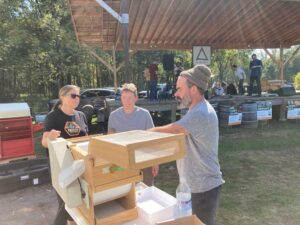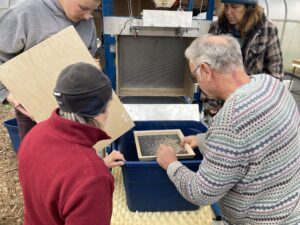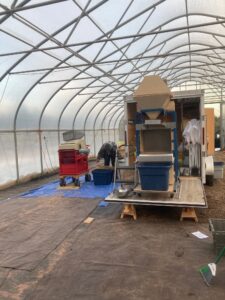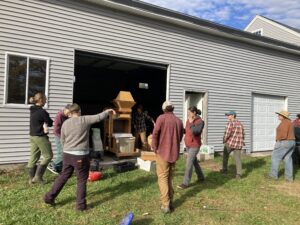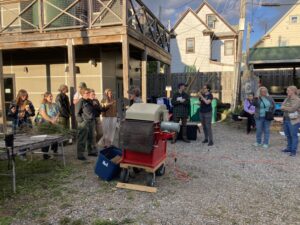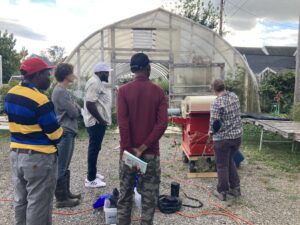Progress report for FNE23-043
Project Information
This project seeks to provide vegetable seed growers with recommended seed processing equipment to improve their efficiency, safety, and profitability.
The mobile seed processing unit will visit a minimum of 4-5 sites throughout New York/New England per year, where 10-15 growers at a time will be trained on equipment usage and then allowed to use equipment to clean their own seed. The trailer will circulate in 2023 and 2024 as part of the NESARE grant, and will expand its range in 2025 and 2026 based on need.
In total, at least 65 commercial seed growers and 30 Indigenous seed keepers will have the opportunity to use the unit between 2023 and 2024. At least one event per year will be focused on community seed saving, and will allow smaller-scale growers to process seed.
Based on feedback from growers using similar seed processing units on the west coast, we expect growers to enjoy up to nine times faster seed processing, and a higher quality final product, as compared to hand cleaning of seed.
Recently NESARE awarded a Research and Education grant to train 65 commercial vegetable growers and 30 Indigenous seed keepers in the Northeast to better produce seed crops. This education will be essential to helping Northeast farmers grow better seed, but lacking equipment to process the seed will severely limit that amount of seed that growers are able to efficiently and economically clean.
Seed production is a relatively new industry to many vegetable farmers in the northeast, hence there is very little processing equipment available on farms and many growers are not yet at the point of committing to purchasing specialized equipment for this trial venture.
The equipment issue currently facing Northeast growers is not new to the seed industry; smaller scale growers on the west coasts of the US and Canada faced a similar bottleneck. The elegant solution employed by FarmFolk, CityFolk, a nonprofit in British Columbia, was to build a mobile processing unit which toured much of BC. The project has been so successful that they have built three additional trailers.
I reached out to the coordinator of the BC Seed Security Project, David Caztel, to find out what lessons they had learned about equipment selection and trailer logistics. He helped identify a very economical combination of equipment that will take seed from its dry form on the plant to marketable quality quickly and safely.
David spoke passionately of the impact this project has had on seed product, following up with the following quote about the project, along with some quotes from growers who used the trailers:
“As the manager of the BC Seed Security Program, I feel that the mobile seed cleaning trailers project has not only increased the quantity and quality of seed being produced in the region, it has also encouraged more farmers to either consider adding seed production to their crop plans, or increase the amount of seeds they produce. The equipment increases efficiency of cleaning, thus increasing profits to the farmer. It has also been an incredible opportunity to engage farmers and the public in seed production work. If you are able to access funding to build and share seed cleaning equipment, I am certain it will be well used and your funders dollars will be very well spent.”- David Catzel
“Our Experience with the Seed Trailer has been amazing. For a small farm like us it is hard to get all the equipment we need. To have access to all of the different seed cleaning equipment is a game changer for us… It makes our work so much easier and also improves the quality of the seed we offer…”- Simon, Seed grower from Good Earth Farms
“…Using the seed trailer's equipment, I only spent 1/10th of the amount of time which I would have spent otherwise working mostly alone processing my seeds. I loved the community aspect of the seed trailer, with community members coming together to process seeds. It felt like a true community harvest…” - Member of the Galiano Seed Library
Historically many farm equipment-sharing proposals fail because everyone needs the same equipment at the same time, or because equipment is large and challenging to transport. Seed processing for dry seeded crops, by contrast, can be done over a period of months as long as growers have a way to dry and then store the seed crop. Additionally, a great deal of seed equipment is quite small and relatively light, resulting in a very complete set of processing equipment fitting into a trailer that can be towed by a light duty truck or van.
In conclusion, I propose using the model of BC’s seed trailers to first reach the growers in the NESARE seed grant, and hopefully to expand the model from there. I expect 65 growers and 30 seed keepers to improve efficiency, profitability, and scale of their seed growing using the trailer. We also anticipate a higher rate of equipment adoption based on exposure and good training. I also expect better use of safety protocols such as PPE usage.
Cooperators
- - Technical Advisor
Research
Construction of seed processing unit: The following equipment was purchased during 2023:
- Lightweight 12 by 6 foot enclosed trailer
- Sasagawa thresher to remove seed from stalks (safe, portable)
- Winnow Wizzard winnower to separate rough chaff from seed
- Specialty screens to size seed and for hand-separation
- Totes, buckets, tarps, grain moisture tester, scale, shop vac, and air compressor
- PPE (masks, safety glasses, hearing protection, gloves)
- Permanent rack and hanger system to secure equipment and keep organized
- Reverse Air Separator to remove lighter non-seed material
We quickly learned that importing equipment (in this case from Japan) can be both costly and time consuming. The Japan Import company rep's English was limited and he was not familiar with the equipment. He only acted as the broker, and we were not able to get in touch with the manufacturer. It was difficult to assess if we should buy the thresher with or without a motor installed. Thinking that the shipping cost would already be covered by shipping both, we opted to get the unit with an attached motor. Apparently, the motor was shipped separately and got lost. The broker replaced the motor and charged us for shipping a second time, which made us go over budget for this item. Once arrived and unpacked we were not able to connect the motor as the wiring diagram was in Japanese. We and our electrical contractor reached out repeatedly to Japan Import to no avail. Fortunately, friends of ours had hosted Japanese exchange students and provided us with contacts that were helpful in translating the wiring diagram.
We also learned that after translating the specs on the motor, Japan Import had sold us a capacitor motor which is not suitable to be used with a speed control unit. This winter we will have to purchase another electric motor suitable to be wired with a speed control.
Purchase of the trailer was successful, and it took a few days to install a solid floor (that can easily be cleaned and used to roll equipment on and off), install the straps to secure the equipment in transit, and organize all the supplies to provide a successful seed cleaning experience for the participants. Between the unforeseen overage on the cost of the thresher we also did not account for all the items that were needed. Some supplies had to be purchased out of the Philia Farm operating budget. One item in particular missing on our original budget was a moisture tester for seed samples ($191).
The Winnow Wizard arrived late in the season, and as soon as we had assembled it we were quickly able to produce very clean seed. The first job of the Winnow Wizard was to clean 25 lbs. of Siberian Kale seed we had grown in our high tunnel over the winter. It was clean in less than two hours.
Demonstrating the Winnow Wizard and the Sasagawa thresher to the seed producers was successful and many were amazed with the amount of time they were able to save. We advertised the trailer's availability through the Northeast Seed Production course, and had growers show interest in using the equipment in Massachusetts, Maine, Eastern NY, and Northern NY. Northeast Seed Trailer Road Show Flyer
Logistics of seed processing unit movement:
At each of the sites an in-depth training on all equipment was be followed by supervised/supported equipment use.
Logistics of unit upkeep and liability:
Each grower who will use the seed processing unit on their farm will be asked to sign a simple contract indicating that they will return the trailer to the condition in which they found it, and providing full contact information. During this pilot phase, we will not ask growers to contribute towards equipment upkeep; when the project has gained traction and it is clear how equipment will be used, we will work with growers to determine use rates to pay for routine maintenance and eventually equipment replacement, plus trailer insurance. So far, no on has taken us up on this arraignment.
Record keeping for impacts:
Each grower was asked to record how much of each seed they processed using the trailer on clipboards provided. This helped track grant impacts and provide a sense of how much use equipment can sustain before needed repairs, etc. SARE Seed Trailer Use
We will provide a more detailed learning outcome when we have another season under our belt.
Education & Outreach Activities and Participation Summary
Participation Summary:
Based on advertisement of the seed trailer to the Northeast Seed class and the Indigenous Seed Keepers in 2023, 4 of the sites had enough interest to warrant bringing the trailer: the Hudson Valley in Eastern NY, Freed Seed Federation in Western Massachusetts, at the Intertribal Agriculture Councils' regional meeting at Akwesasne (northern NY), and at our farm in Eastern NY. A fifth site at the Maine Farmer to Farmer Conference convened growers but did not include the trailer, due to the the long travel distance and relatively small number of growers (4).
In 2024 the trailer traveled to Buffalo Seed Expo-5, back to the St. Regis Mohawk Reservation, and to two locations in the Hudson Valley of New York: Hudson Valley Seed Company for an open house weekend and to White Feather Farm for an extended use cleaning sorghum. The trailer was also discussed at a farmer-to-farmer session at the New England Fruit and Vegetable Conference in Manchester, NH in December.
Many of us had never been exposed to mechanized seed threshing or cleaning prior to this grant. We all learned that it is not only easy to use the equipment we selected but that it saves an enormous amount of time, cleaning out not only the chaff but also the smaller, less viable seeds.
We were both disappointed and at times pleasantly surprised with the quality of the thresher. It works very well on large seeds and on seeds that are embedded in a seed head. While we were hoping it would be able to thresh onion seed, it was not able to separate the seed from the umbel. In order to prevent other small seeds from flying out the back we made an improvised screen that catches everything the blower expels. So far it has worked well on a variety of small seeds including Rudbeckia and lettuce.
Demonstrating the Winnow Wizard and the Sasagawa thresher to the seed producers was successful and many were amazed with the amount of time they were able to save
Learning Outcomes
3 Farms, Hudson Valley Seed Company, Tuckaway Farm, and White Feather Farm have purchased equipment based on using it with the seed trailer.
15 farmers have reported that they will expand seed production based on increased confidence in processing it after harvest.
23 farmers reported increased understanding of what tools are available to process seed.
In general, farmers expressed an increased sense of community at the seed meetings.
Project Outcomes
As a result, three participants have ordered a Sasagawa thresher (Hudson Valley Seed Company, White Feather Farm, ).
In 2023 11 growers used the equipment to clean their seed.
In 2024 9 growers used the equipment to clean their seed, and an additional 20 came to see the equipment and learn about it at meetings.
In 2023 and 2024, 10-15 indigenous seed keepers used hand-scale equipment to clean seed at the St. Regis Mohawk Reservation, and over 45 people got to see the equipment working. The seed trailer was covered by Akwesasne TV here: https://www.facebook.com/AkwesasneTV/posts/pfbid02baE7DramEW1MmHw43t3NgiYBDnggeKhiKGPbLgNiQ7KRrM4Ai9ZmjCmsBVpYw4dxl?mibextid=YxdKMJ
Growers throughout the northeast have been excited by the prospect of using seed cleaning equipment to efficiently clean their seed. This project has increased the visibility of seed production and has inspired other groups to source equipment as well.
